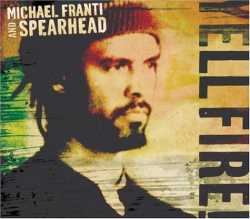|
Taken from The University Daily Kansan (Nov 30, 2006)
Singer connects with youth about Iraq war
Dealing with tragedy on human scale helps Americans understand
Michael Franti's new CD, Yell Fire, helps American youth understand what is happening with the Iraq war. Franti traveled to the Middle East and came back with knew knowledge to share with his listeners.
by Tasha Riggins
 A few rhyming bumper stickers does not an anti-war activist make. Today, youth proudly display bumper stickers that say things like “Buck Fush,” or “You can bomb the world to pieces, but you can’t bomb it into peace.” For the 18-25-year-old demographic, it’s cool to protest the war in Iraq. I’m not sure if it’s the rumblings of rebellious youth testing the boundaries set by their parents, or if we really feel that war is wrong. Writer Rich Brooks of the Sarasota-Tribune Herald stated it perfectly when he wrote, “Without the threat of Uncle Sam taking away your freedom, today’s college students don’t have a stake in the Iraq war.” A few rhyming bumper stickers does not an anti-war activist make. Today, youth proudly display bumper stickers that say things like “Buck Fush,” or “You can bomb the world to pieces, but you can’t bomb it into peace.” For the 18-25-year-old demographic, it’s cool to protest the war in Iraq. I’m not sure if it’s the rumblings of rebellious youth testing the boundaries set by their parents, or if we really feel that war is wrong. Writer Rich Brooks of the Sarasota-Tribune Herald stated it perfectly when he wrote, “Without the threat of Uncle Sam taking away your freedom, today’s college students don’t have a stake in the Iraq war.”
The war in Iraq has been connected to the Vietnam War, which had a strong youth anti-war following.
How is this demographic supposed to understand the war? One answer is to listen to Michael Franti and Spearhead’s newest CD, Yell Fire. A year ago, Franti was just another singer angry with U.S. politics and the decision to invade Iraq. However, instead of writing a few hit singles about it, he decided to go to the Middle East. While visiting Iraq, Israel and Palestine, he didn’t talk to politicians and religious leaders — he talked to the people. He talked to soldiers on both sides, went into war-torn neighborhoods and talked to the people affected most by the invasion.
Franti views war on a human scale. He doesn’t give numbers of bodies. There have been an estimated 655,000 Iraqis killed as of this July, according to a study done by Johns Hopkins University. Imagining 655,000 units of anything is hard enough — imagining 655,000 bodies is even more out of Americans’ realms of imagination. Putting a face with the cause creates a relationship between the cause and the activist. Franti attempts to build that connection for his young fan base. He’s the pied piper of peace for the youth music market.
Franti doesn’t use political terminology that most cannot comprehend. He likens Iraqis to Americans by inextricably linking us and them. The end result is an “other” with a shared understanding. How many of us have been to the Middle East? Most of us don’t have that human connection to the war-torn area, particularly Iraq. By making a multitude of connections between the two cultures, Franti attempts to break down the distance barriers. An example of this is in the song “Love Enough,” in which he asks, “What language are your tears?”
In the song “What I’ve Seen,” Franti sings of things that aren’t seen on the 6 p.m. news: “Razor wire on the street, every corner / 90 degrees at six in the morning / Run like mad just to make a connection / Pack what you need for your own protection.” Showing, not telling, Franti puts listeners as close as he possibly can to the Iraqis’ position.
The war in Iraq has been connected to the Vietnam War, which had a strong youth anti-war following. However, those Vietnam War protestors were attempting to avoid the draft and create cultural change. In a society that has no draft but does have political apathy, why should youth be expected to care about the war?
Franti’s answer is that we’re all human. Geographic boundaries, religions and skin tone may divide us, yet we’re all residents on Earth together. In the song “Hello Bonjour,” Franti sings, “Don’t tell a man that he can’t come here ‘cause he got brown eyes and a wavy kinda hair / Don’t tell a woman that she can’t go there because she prays a little different to a God up there / You say you’re a Christian ‘cause God made you / You say you’re a Muslim ‘cause God made you / Then we all kill each other ‘cause God told us to?”
According to the London newspaper The Guardian, “The Bush administration’s response to its critics in the entertainment industry has been to portray them as pampered liberals out of touch with ordinary Americans.” So while artists can benefit by filling a niche market for anti-war music, Franti took on the task of relating emotions of distrust, anger and fear on a human level for all listeners to understand. He offers a voice and a conscience to a generation that has never been held responsible. Yes, there are 18-25 year-olds who are anti-Bush and anti-war, yet cannot find Iraq on a map, or believe the Gaza Strip to be the name of a steak. However, Franti’s music presents a vivid picture that may influence followers to become activists.
Tasha Riggins is a Lawrence graduate student in journalism.
|